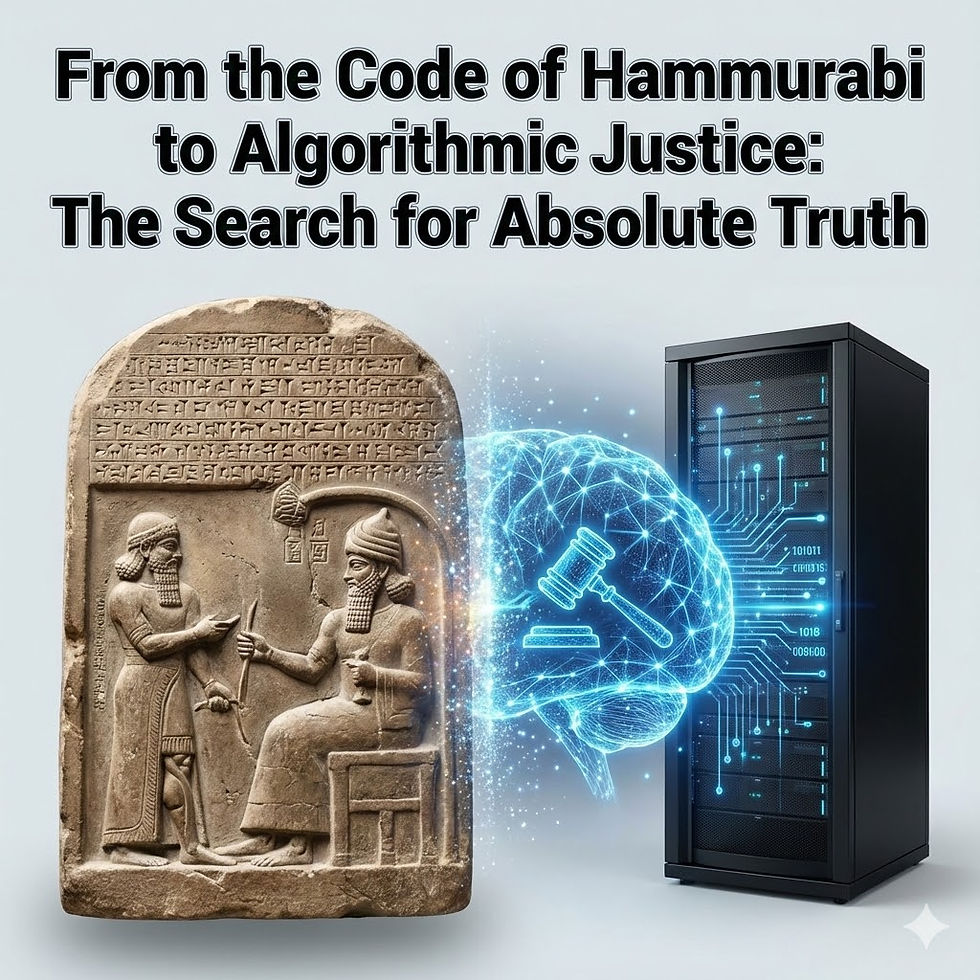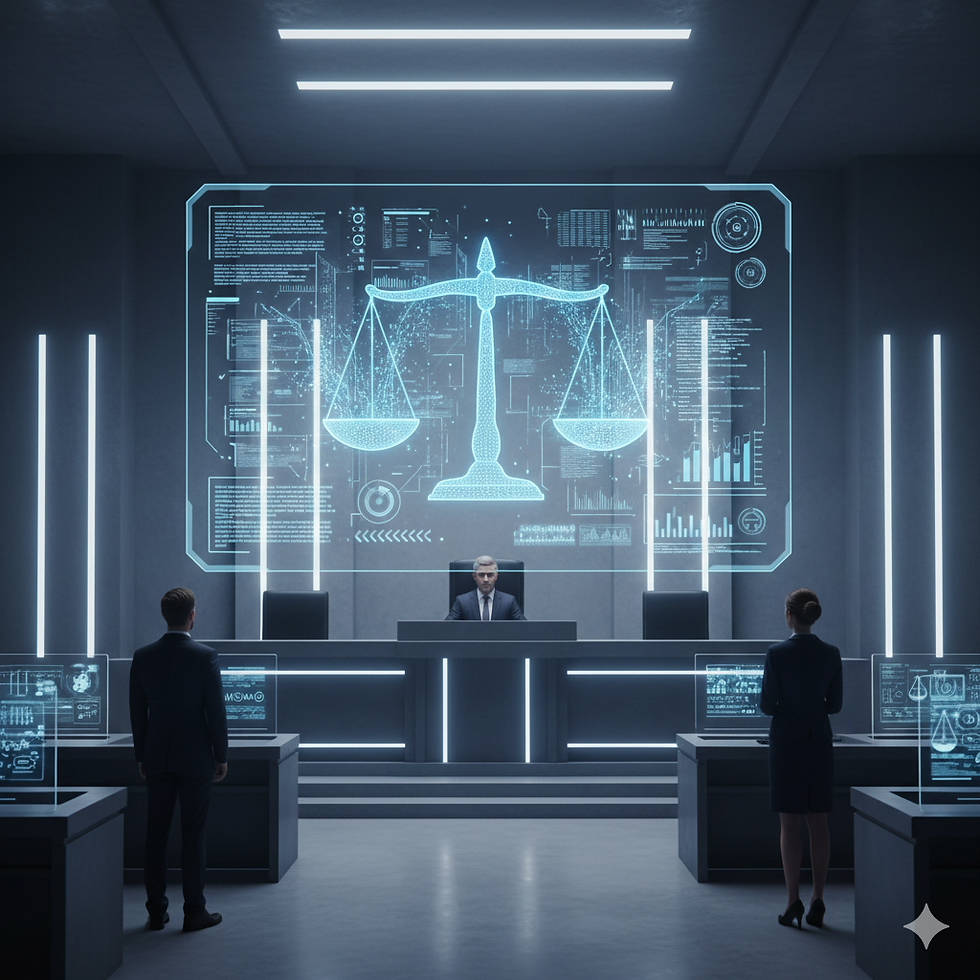Legal Tech Tussle: AI-Powered Legal Research vs. Traditional Paralegal Work
- Phoenix

- Jun 14, 2025
- 7 min read
Updated: Dec 2, 2025

👑⚖️ Redefining Roles in the Modern Law Firm
For decades, the foundation of legal work has been built on meticulous human effort. The traditional paralegal, a skilled professional, has been the indispensable engine of law firms, spending countless hours sifting through case law, organizing evidence, and preparing documents. But a powerful new force has entered the courtroom: AI-powered legal tech. Platforms like Casetext and Lexis+ AI can now analyze millions of documents in seconds, draft legal memos, and identify relevant precedents with superhuman speed.
This has ignited a high-stakes battle for the future of the legal profession. It's a duel that pits the efficiency and data-processing power of artificial intelligence against the experience, intuition, and strategic thinking of the human paralegal. Is AI set to replace this vital human role, or will it forge a new, more powerful partnership?
Quick Navigation:
I. 🚀 Speed & Data Processing: Who Can Conquer the Document Mountain?
II. 💰 Cost-Effectiveness: Who Provides the Better ROI for a Law Firm?
III. 🛡️ Accuracy & Reliability: Who Is More Likely to Make a Critical Mistake?
IV. 🧠 Strategic Insight & Human Judgment: Who Can Actually Win the Case?
V. 🌍 The Royal Decree & The "Ethical Advocate" Protocol
Let's bring this case to the bench and examine the evidence. 🚀
The Core Content: A Legal Inquisition
Here is your comprehensive analysis, categorized by the core questions that define value and risk in the legal profession.
I. 🚀 Speed & Data Processing: Who Can Conquer the Document Mountain?
Modern legal cases can involve millions of documents (e-discovery). This is a battle of pure processing power.
🥊 The Contenders: A team of paralegals manually reviewing documents vs. an AI platform ingesting and analyzing the entire dataset.
🏆 The Verdict: AI-Powered Legal Research, in one of the most decisive victories imaginable.
📜 The Royal Decree (Why): An AI can perform tasks in minutes that would take a team of humans months to complete. It can review millions of emails for relevance, cross-reference thousands of case files for a specific legal precedent, and summarize lengthy depositions almost instantly. For data-intensive tasks like e-discovery and initial case law research, the speed and scale of AI are not just an improvement—they represent a complete paradigm shift.
II. 💰 Cost-Effectiveness: Who Provides the Better ROI for a Law Firm?
Law firms are businesses. This is a battle of billable hours versus subscription fees.
🥊 The Contenders: The ongoing salary and overhead of a human paralegal vs. the licensing cost of an AI software platform.
🏆 The Verdict: AI-Powered Legal Research.
📜 The Royal Decree (Why): While AI platforms require a significant subscription fee, they can reduce the billable hours spent on research and document review by an estimated 50-70% or more. This allows firms to handle more cases, provide faster answers to clients, and offer more competitive pricing. While a human paralegal is essential, augmenting their work with AI tools leads to a dramatic increase in efficiency and a powerful return on investment.
III. 🛡️ Accuracy & Reliability: Who Is More Likely to Make a Critical Mistake?
In law, a single mistake—a missed precedent, a misinterpreted clause—can be catastrophic. This is the battle for dependability.
🥊 The Contenders: The risk of human error (fatigue, oversight) vs. the risk of AI error ("hallucinations").
🏆 The Verdict: A complex draw, with the edge going to Human Oversight.
📜 The Royal Decree (Why): Humans get tired and can miss things. AI, however, has a unique and far more dangerous flaw: hallucinations. Generative AI models can confidently invent fake case citations or completely misinterpret legal statutes. A 2023 case where a lawyer was sanctioned for citing fake cases generated by ChatGPT highlighted this risk perfectly. While AI is incredibly accurate at finding existing data, it cannot yet be trusted to reason about it reliably without a human expert to verify every single output. The reliability of AI is conditional on the quality of its human supervisor.
IV. 🧠 Strategic Insight & Human Judgment: Who Can Actually Win the Case?
A legal case is more than a collection of facts; it's a human story and a strategic battle. This is the duel for the unquantifiable art of law.
🥊 The Contenders: An AI analyzing patterns in data vs. a human paralegal understanding the context of the client, the judge, and the opposition.
🏆 The Verdict: Traditional Paralegal Work, unequivocally.
📜 The Royal Decree (Why): An AI can tell you what the law says. A human paralegal can help a lawyer understand why it matters in the context of a specific case. They can anticipate an opposing counsel's argument, understand the emotional state of a client, and notice a subtle discrepancy in a witness's testimony that an AI would overlook. This ability to synthesize legal knowledge with human intuition, strategic thinking, and real-world context is the core of legal practice. It is a deeply human skill that AI cannot replicate.
V. 🌍 The Royal Decree & The "Ethical Advocate" Protocol
The debate over AI vs. paralegal is a false dichotomy. AI is not a replacement for human expertise; it is an incredibly powerful tool that amplifies it.
The crown is not awarded to a machine or a human, but to a new, synthesized role: The AI-Augmented Paralegal.
The future of the legal profession belongs to the paralegals and lawyers who can master these AI tools. They will delegate the brute-force data processing and research to the machine, freeing up their own time to focus on the high-value human work: strategy, client interaction, and critical thinking. The paralegal's role will evolve from a "doer" of repetitive tasks to a "manager" and "verifier" of AI-driven insights.
This new partnership demands a new ethical framework.

🌱 The "Ethical Advocate" Protocol: A Script for Integrating AI in Law
In line with our mission, we propose this protocol for the responsible use of AI in the legal profession.
🛡️ The Mandate of Human Supremacy: The final legal judgment, advice, or strategic decision must always be made by a qualified human professional. AI is a tool for support, never the ultimate arbiter.
💖 The Command of Verification: Never trust, always verify. Every piece of information, every case citation, and every summary generated by an AI must be independently verified by a human expert for accuracy and context before it is used in any official capacity.
🧠 The Confidentiality Edict: Uphold absolute client confidentiality. Only use AI platforms that offer enterprise-grade security and a guarantee that your client's sensitive data will not be used to train public AI models.
⚖️ The Transparency Principle: Be transparent with clients about the use of AI tools in their case, including how it affects billing and strategy. This builds trust and manages expectations.
🤝 The Access to Justice Imperative: Leverage the efficiency gains from AI not just to increase profits, but to increase access to justice. Use these tools to lower costs for underserved clients and to expand pro bono services, fulfilling the legal profession's core duty to society.
By adopting this protocol, the legal profession can harness the power of AI to create a more efficient, effective, and ultimately, more just system for all.
💬 Your Turn: Join the Discussion!
The intersection of AI and law is one of the most fascinating and consequential areas of modern life.
If you were a lawyer or client, would you trust an AI to conduct research for your case? Where would you draw the line?
Do you believe the role of the paralegal will eventually be automated, or will it simply evolve?
What ethical rules do you think should be put in place to govern the use of AI in law?
How could AI be used to help ordinary people better understand their legal rights and access the justice system?
What other professions do you think will be most impacted by this kind of human-AI collaboration?
Share your thoughts and join this critical conversation in the comments below! 👇
📖 Glossary of Key Terms:
Paralegal: A person trained in legal matters who performs substantive legal work that requires knowledge of the law and procedures but is not a qualified lawyer.
Legal Tech: The use of technology and software to provide legal services and support the legal industry.
AI-Powered Legal Research: The use of Artificial Intelligence to analyze large volumes of legal documents, case law, and statutes to find relevant information and precedents.
E-Discovery (Electronic Discovery): The process in legal cases of identifying, collecting, and producing electronically stored information (ESI) in response to a request for production.
Generative AI: A class of artificial intelligence models capable of generating new text, images, or other content. In law, this can be used to draft initial versions of legal documents.
AI Hallucination: A phenomenon where an AI model generates false, nonsensical, or factually incorrect information but presents it as if it were true.
📝 Terms & Conditions
ℹ️ For Informational Purposes Only: This post is for general informational and analytical purposes and does not constitute legal advice.
🔍 Legal Disclaimer: The information provided here is not a substitute for professional legal advice from a qualified attorney. Always consult with a lawyer for advice on your specific legal issues.
🚫 No Endorsement: This analysis does not constitute an official endorsement of any specific legal tech platform or law firm by aiwa-ai.com.
🔗 External Links: This post contains links to external sites. aiwa-ai.com is not responsible for the content or policies of these third-party sites.
🧑⚖️ User Responsibility: The "Ethical Advocate" Protocol is a guiding framework. Legal professionals are bound by the ethical duties and regulations of their respective bar associations.

Posts on the topic ⚖️ AI in Jurisprudence:
Algorithmic Justice: The End of Bias or Its "Bug-Like" Automation?
Legal Tech Tussle: AI-Powered Legal Research vs. Traditional Paralegal Work
Legal Edge: 100 AI Tips & Tricks for Jurisprudence
Jurisprudence: 100 AI-Powered Business and Startup Ideas for the Legal Industry
Jurisprudence: AI Innovators "TOP-100"
Jurisprudence: Records and Anti-records
Jurisprudence: The Best Resources from AI
Statistics in Jurisprudence from AI
AI and Access to Justice
AI and the Courtroom
AI in Legal Ethics and Professional Responsibility
AI in Legal Representation and Decision-Making
AI in Legal Research and Discovery
Top AI Solutions for Legal Practice
Law and AI: Navigating Uncharted Waters




Comments